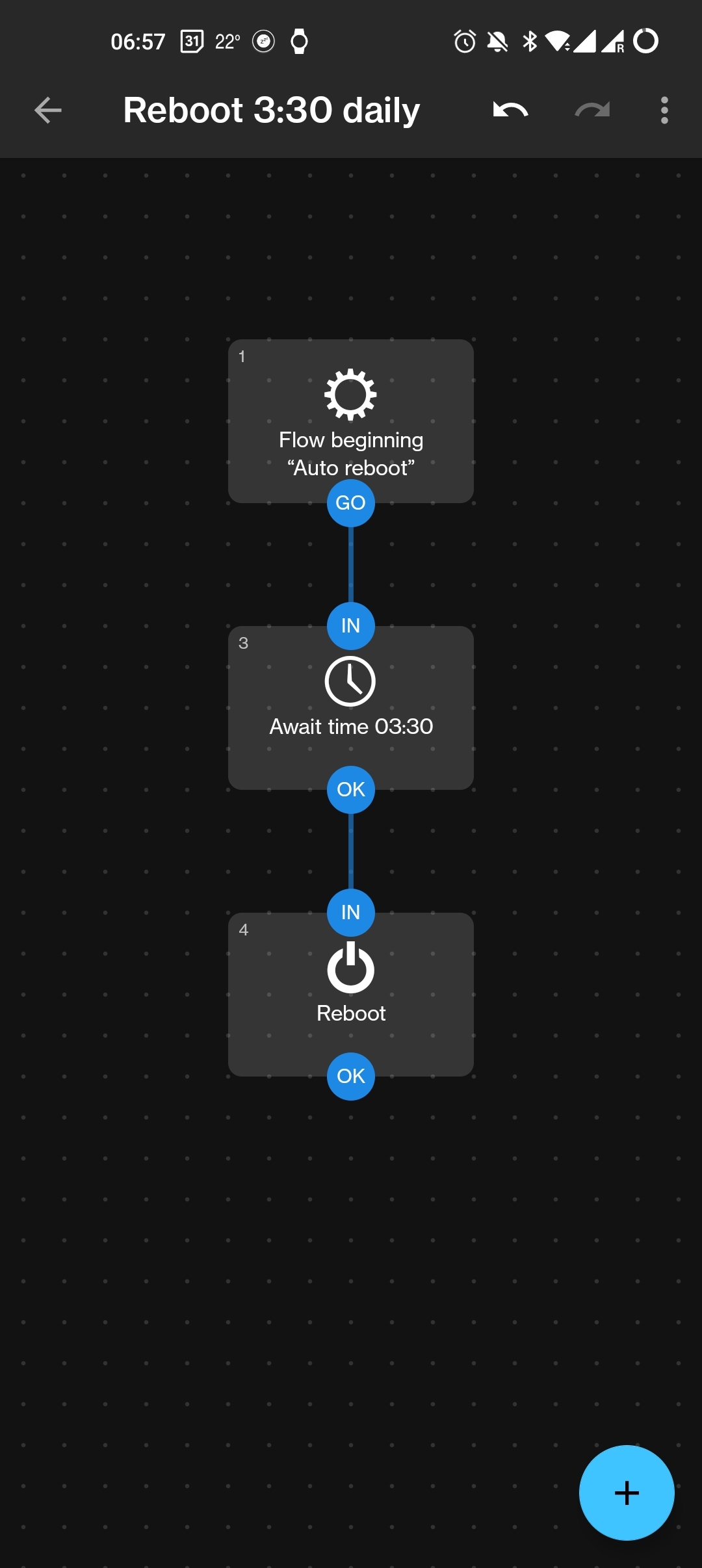Samsung phones have an option of scheduled autorestart; I have mine set to restart once every week at a scheduled time.
LineageOS has this option too. The whole system crashes and restarts randomly once a week /s
Just once a week? They must be improving.
“you do need to restart your phone regularly to rid it of demons”
typo: “daemons”, not “demons”.
I’m doubtful. I wanna hear more from security experts.
The bootloader of your phone (if locked) is one of the most secure parts. It’s very hard to get into a modern phones bootloader. In contrast, finding an exploit in a running phone is a lot more feasible.
If a vulnerability was abused to get into your running phone, it will persist until the phone reboots, and the bootloader verifies the core parts of the operating system at startup. In order to persist past a reboot, malware like that would need a vulnerability in the bootloader, or a bypass for its integrity checks.
Alongside that, any background services (“daemons”) that got stuck or became slow over time are forced to restart. Operating system updates can be applied, and working memory is cleared.
In general, it’s just good advice to just reboot your phone once in a while. There’s no harm in doing so.
TL;DR:
Restarting your phone once a week can help improve performance and security.- this is the same for routers and it’s commonly known as a power refresh
Maybe home grade routers.
If my router rebooted once a week, it would be in the trash can.
well, I mean… anything can leak memory. but yeah, enterprise/carrier grade devices are designed to be in continuous use for years and they generally do that pretty well.
I wonder if the regular updates mine does count.
Yes, a reboot is a reboot. As long as the boot sequence cycles through where the code is validated, you’re good.
a reboot is a reboot
Not always. Some phones will do a sort of “soft” reboot, which doesn’t actually go through the entire boot process, but is more like logging out of the active OS user and back in, reloading some of the OS but not all.
Pretty sure a system update would trigger a full reboot, though, but I’ve seen the option for this sort of partial reboot in the power menu on some devices in the past.
Restarting anything with a chip in it once and a while is good practice.
This is the best summary I could come up with:
Forbes uncovered a seriously dated NSA document outlining the best practices for keeping your phone safe from bad actors in the digital space.
The phones depicted are a 2010s-era iPhone with the original push-button Home button and a Samsung Galaxy smartphone.
Over a dozen tips are included, ranging from “considering using Biometrics” to “only use original charging cords.” It’s all fundamental stuff you’ve seen before, but the advice that’s got everyone’s ears perked up is the NSA’s suggestion to power your device off and back on weekly.
It’s a simple way to either force a waning software update or clear any background apps and memory leaks that might contribute to a too-hot-too-handle metal phone.
I’m a frequent restarter because I have cell signal issues in my area—a quick reboot usually does the trick, though not without my heart beating rapidly as I wait to see those mobile service bars return.
The Google Pixel doesn’t have a scheduled offering, but there is an option you can toggle on to have the device automatically restart once it receives an over-the-air (OTA) software update.
The original article contains 314 words, the summary contains 181 words. Saved 42%. I’m a bot and I’m open source!
Oh. I had a habit of taking the battery out of that laggy shit, then turning it on again.
My iPhone 13 mini‘s battery is so small that I involuntarily restart it at least once every two weeks
You do it because it makes an attacker’s life harder.
The entire boot chain of the phone up to the apps you run are verified successively by the complement that loads it. A digital signature helps ensure that only trustworthy code ever runs.
This means that if you get hacked and malware is injected by an exploit, the attacker has to work harder to solve the problem of how you convince the phone to load it again because the code it’s made of isn’t generally going to be vendor approved code. When you reboot, you are effectively forcing a validation that all the code you have running is authentic.
Idk man I just do it when my phone won’t ring when I get a call from my dad or doctor or something, so I have to go delete the voicemail and call them back. So like, every couple of weeks. I think it’s a Samsung thing, happened on my last phone too.
Nothing wrong with that. I don’t think it’s a mistake to not reboot your phone until you need to. It’s your phone. It’s not like rebooting your phone will save lives or the planet.
My wife doesn’t even use a lock screen password. I’m interested in the nuances of such things.
Thanks for taking the time to write that out. I found it really helpful.👍
I love to talk about computer security. I don’t get the chance often enough.
I hope you get more chances to do so; you explained the situation in a much better way than the article and convinced me to reboot my phone.
You restart your phone because of security.
I ‘restart’ my phone, because it’s overheated and lost its battery % to 0.
We’re not the same.
Thank you, friend. You’ve convinced me to restart my phone.
Personally, I restart mine maybe once a week. No need to go crazy with it, but it helps make life harder for bad actors and might make your phone run better.
Exactly, as you already explained in detail this is primarily for security.
GrapheneOS has a feature to set a time after which the phone reboots in case there was no unlock. So in case a bad actor gets your phone they only have that time with a running system after the first unlock. However, if you use it normally, and unlock it in regular intervals it does not auto-reboot. This is especially neat if your threat level is not “investigative journalist” or “political activist on the run”, because then you can set the time to a longer interval and the phone does not reboot every night when you are asleep which also leads to the SIM card being locked and nobody being able to call you…
I remember this feature, and I wish it was a standard Android feature. It sounds like it would be trivial to implement and could be completely optional.
Jokes on them, my S22 Ultra restarts in it’s own. Even when I don’t want it to.
It’s a feature! Device Failed Successfully.
This is gonna sound odd, but have you cleaned out the USB port lately? Weird stuff happens when pocket lint collects in there. I thought mine had a dead port until I picked out (with a non-conductive toothpick) the lint I didn’t realize had accumulated.
Don’t e.g. alarm apps not work after that until you unlock your phone since the device data decryption keys weren’t kept in RAM after rebooting? I have that feature off since I don’t want that to happen. Afaik AOSP has added that to make installing updates more seamless, but it’d be useful for this too. (And since Samsung usually sucks at improving their already self-made stuff to align with AOSP, like Virtual A/B updates, I’m just assuming this)
iphones just do weird shit after a while so that you can’t go on without a restart. truly smart
Update your spyware regularly
I remember my old phone had the option to auto reboot and I had it set to like 3am but now I don’t see that option on newer phones. My previous phone didn’t even have a reboot option I had to shut it down and power it back up
I’m using Automate for this purpose, it’s a very simple flow:

https://play.google.com/store/apps/details?id=com.llamalab.automate
For Samsung phones. Go to Settings -> Device Care -> Under Performance you will see Auto Optimization -> At the bottom of the page you will see Auto Restart -> Restart on Schedule -> Done.
Would alarms work after a restart if I don’t unlock ot first?
For iOS they do; I would assume for Android they will as well. It would be pretty bad if an automatic update stopped you from waking up in the morning…
I’ve noticed my phone doesn’t initialize anything until I unlock it then it takes a while for it to boot up and all that but also I haven’t seen it reboot on its own, it usually gives you a prompt
Wait…the NSA did something good. WTF.
finaly the nsa doesn’t do something stupid
I’d love to see your list of “stupid” things… not immoral, vicious, incendiary, criminal, etc…but stupid. None of those things is stupid if they are also your fundamental mandate.
✨ Us government instance discovered ✨
GrapheneOS has a convenient auto-reboot feature
TIL, I use GOS and never thought to look, I just see a banner saying there’s been updates and I’ve got “update and restart now”, “schedule restart” and “I’ll restart myself when ready” (or some such).
The main purpose of this is actually security. Because when the device is in BFU (before first unlock) state, it’s much harder to gain access to the data (without the correct unlock credentials). During the reboot, the encryption keys are wiped from RAM, making it essentially impossible to access the device, since brute-force unlock attempts are prohibited by Weaver API, which is enforced by the Titan M2 hardware security module. You can read more about this at https://grapheneos.org/faq#encryption
I will give that a read. I have been unintentionally using this feature, anytime I expect I won’t use the GOS pixel for a bit I restart it, I’ve also found it disables biometrics as a security measure. Cool stuff.
It doesn’t intentionally disable biometrics. Disabling biometrics is just a logical consequence of wiping the encryption keys from RAM. Your data is encrypted with your password as the key (not exactly, it first goes through a key derivation function, but the PIN/password is the entry point for the KDF). Your biometric information can’t decrypt your data, as your data is not encrypted with your biometric information as the key. When using biometrics, the encryption key is kept in RAM, and the biometric data is only validated by the OS. No actual decryption occurs here. The data on your phone is only being decrypted during the first unlock after a reboot. That’s why security states are grouped into BFU (before first unlock) and AFU (after first unlock).
Thank you for your in depth explanation, hope your comments help many others on top of myself.
Samsung has had the auto reboot feature for a long time too.
This! Actually a great feature on GrapheneOS, been using it for over a year now.














